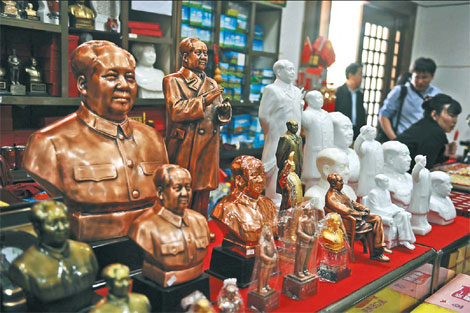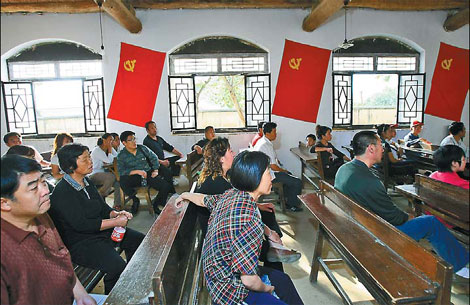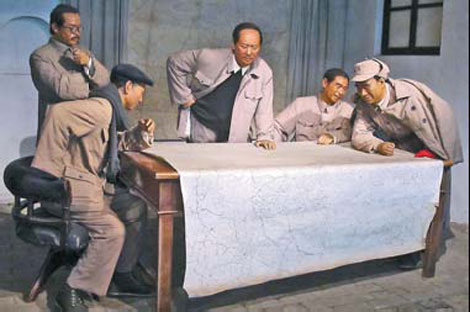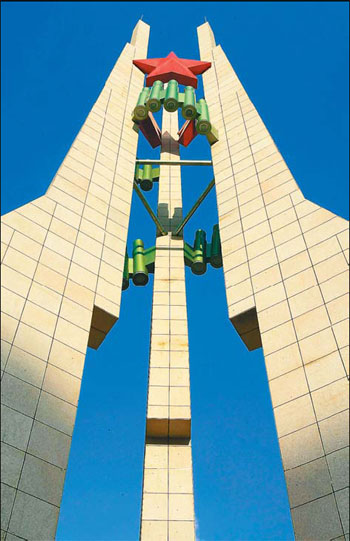 |
|
Statues of Chairman Mao Zedong in different sizes are popular souvenirs at Xibaipo Museum. Zhao Yonghui / For China Daily |
 |
|
Visitors at a meeting room in Xibaipo, where some historic Party meetings were held. Zhao Yun / For China Daily |
 |
|
Waxworks of Liu Shaoqi (from left), Ren Bishi, Mao Zedong, Zhou Enlai and Zhu De are on display at the museum. Mike Peters / China Daily |
 |
|
The memorial monument at Xibaipo. Zhao Yun / For China Daily |
A tour of the revolutionary sites of Hebei province ideally takes in Xibaipo Museum, an interactive guide to China's civil war, Ranzhuang's Underground Tunnel Museum account of the War of Resistance against Japanese Aggression, and the military base of Handan - leaving time for the attractions of Baiyangdian Lake and Goddess Nuwa's Temple as a natural counterpoint to history.
Mao Zedong. Zhou Enlai. Zhu De. Liu Shaoqi. Ren Bishi. The names are a roll call of history, especially the history of China's civil war that produced New China in 1949. The names were imposing when those leaders lived, and they are imposing today, especially when visitors to Xibaipo Museum see the five men in full revolutionary grandeur, as larger-than-life bronze sculptures that gleam in the sun. While the statues and the museum are meant to impress, the guides at the museum are eager to deliver more than just a stuffy history lesson. Dressed in the sharply creased uniforms of the People's Liberation Army (PLA), they walk our group through 11 exhibition halls - from a full-size model of Mao's living quarters when his army unit was based here, to a moving display about Bai Qiu'en (Henry Norman Bethune), the Canadian doctor who spent years caring for wounded soldiers on the frontlines.

Finally, we arrive at a converted classroom that feels rather spiritual, with its vaulted ceiling, its pew-like arrangement of desks and the large portrait of Mao behind a table covered with a tiger skin. Tour groups mill around, whispering about the Communist Party of China's second plenary session that took place in this room.
And then museum guide Yao Jun suddenly bursts into song.
"Most of us are art majors," says Yao, who has been a tour guide here for eight years and can't imagine doing anything else.
"I love the history so much," he says. "Because of that, my job feels sacred - an opportunity to share the information in a way that deepens my own understanding and growth."
Xibaipo was the PLA headquarters from 1948 until the victorious troops marched to Beijing to accept the surrender of the Kuomintang garrison there.
Yao and his colleagues sing a combination of traditional and inspirational songs from the time of the revolution, both on guided tours of the site and at shows they organize for groups at the nearby hotel.
Yao also helped write and star in a situation comedy, The Land to Be Returned to the Hometown. In this song-and-dance production, Yao transforms himself from a bright-eyed 31-year-old to a bright-eyed old timer, with gray hair and a wispy beard, who revels in the land reforms that give him a personal stake in New China.
Human touch
That human touch is just one way the museum makes history come to life. Though the exhibits can be hard for foreigners to follow (most signs and verbal explanations are in Chinese), every face in every display tells a story.
One picture shows a group of frontline nurses chatting with Mao, while a panorama shot shows men pushing the wooden, single-wheel carts that the locals used to bring food and supplies to the encamped soldiers.
Visitors will see Zhou Enlai's adopted daughter smiling down from a portrait in the replica of his bedroom, and the quarters for nannies and children at the entrance to Mao's own living quarters.
The war-planning headquarters nearby is a surprisingly small room with a large conference table and two wall maps - which come to life with a dizzying array of red and black arrows that track the army's movements and battles. Nearby stands a personal desk, bare except for a period-piece telephone, and there is a photo of Mao focused on the composition of a telegraph message with battle instructions.
The telegraph, we learn as we stride through the exhibits, is a recurring theme: In one beautiful long white hallway, Mao's telegram urgings to his troops are carved into the walls for posterity.
More than propaganda
Some visitors - especially foreigners - may be surprised by the candid records of individuals who eventually challenged the Party line.
"In the past, we didn't say much about that," Yao acknowledges. "And we didn't say much about people like Lin Biao", Mao's one-time confidante and heir apparent, who died in a plane crash while fleeing to Russia.
"As humans, we are all good and bad, and so I think we should know the good things he did," Yao says of Lin's important contributions during the civil war era. "Now we are more open, and we want to tell the complete story, and let people make up their own minds."
The joy Yao finds in his job goes beyond the history.
"The environment is good," he says, noting the gleaming nearby reservoir, a 1.5 billion-cubic-meter waterway that provides drinking water to the region. "The sky is blue. It is comfortable to live here."
While most visitors are middle-aged, there are also people whose parents lived during the war, a few are schoolchildren, others are young men and women currently serving in China's military. Many of the foreign visitors are students at the country's military colleges. Most of the latter are familiar with Mao, though they may know little about the other important figures of the time. Yao and his colleagues are happy to fill in the gaps.
I ask the smiling guide what he might like to ask Mao, if China's revolutionary leader were sitting before him today.
That stops him in his tracks - but only for a moment.
"I think I would ask him, 'How can we carry on the spirit of the PLA from that time?'" Yao says seriously. |